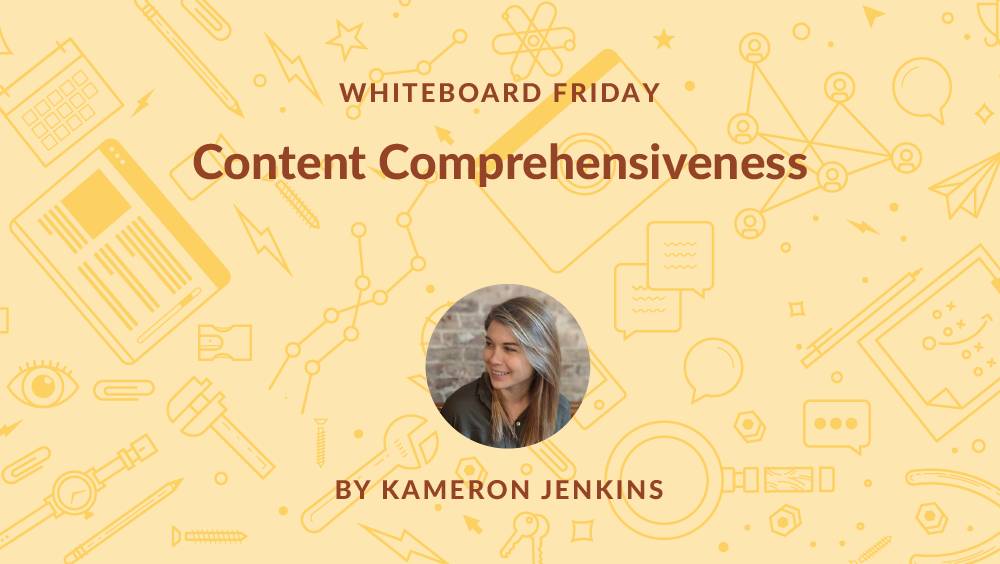Then Google goes, "Okay, high quality is something that's comprehensive and complete. So hopefully, by way of example, we'll be able to kind of walk you through what comprehensiveness looks like for this one particular query. Before we dive in, even before we look into keyword research tools or anything like that, I think it's really important to just like let the query sit with you for a little bit. And too, you just look at the query, "guide to buying a house," people are probably searching that if they've never bought a house before. So the implications here, a guide to buying a house, that is a big financial decision. But it's a really great way to type in a keyword, like "buying a house" or "buy a house" or "home buying" or something like that, and get a whole, big, long list of questions that your audience is asking. People that want to know how to buy a house, they're also asking these questions. I think a comprehensive page will answer those questions. So what I did with this query, I queried "buy a house," and I wanted to see if there were any trends for home buying-type of research queries in Google Trends. This page is not comprehensive.
When Google says they prefer comprehensive, complete content, what does that really mean? In this week’s episode of Whiteboard Friday, Kameron Jenkins explores actionable ways to translate the demands of the search engines into valuable, quality content that should help you rank.


Click on the whiteboard image above to open a high-resolution version in a new tab!
Video Transcription
Hey, guys. Welcome to this week’s edition of Whiteboard Friday. My name is Kameron Jenkins, and I work here at Moz.
Today we’re going to be talking about the quality of content comprehensiveness and what that means and why sometimes it can be confusing. I want to use an example scenario of a conversation that tends to go on between SEOs and Google. So here we go.
An SEO usually says something like, “Okay, Google, you say you want to rank high-quality content. But what does that really mean? What is high quality, because we need more specifics than that.”
Then Google goes, “Okay, high quality is something that’s comprehensive and complete. Yeah, it’s really comprehensive.” SEOs go, “Well, wait. What does that even mean?”
That’s kind of what this was born out of. Just kind of an explanation of what is comprehensive, what does Google mean when they say that, and how that differs depending on the query.
Here we have an example page, and I’ll kind of walk you through it. It’s just going to serve to demonstrate why when Google says “comprehensive,” that can mean something different for an e-commerce page than it would for a history of soccer page. It’s really going to differ depending on the query, because people want all sorts of different kinds of things. Their intent is going to be different depending on what they’re searching in Google. So the criteria is going to be different for comprehensiveness. So hopefully, by way of example, we’ll be able to kind of walk you through what comprehensiveness looks like for this one particular query. So let’s just dive in.
1. Intent
All right. So first I’m going to talk about intent. I have here a Complete Guide to Buying a House. This is the query I used as an example. Before we dive in, even before we look into keyword research tools or anything like that, I think it’s really important to just like let the query sit with you for a little bit. So “guide to buying a house,” okay, I’m going to think about that and think about what the searcher probably wanted based on the query.

So first of all, I noticed “guide.” The word “guide” to me makes it sound like someone wants something very complete, very thorough. They don’t just want quick tips. They don’t want a quick bullet list. This can be longer, because someone is searching for a comprehensive guide.
“To buying a house,” that’s a process. That’s not like an add-to-cart like Amazon. It’s a step-by-step. There are multiple phases to that type of process. It’s really important to realize here that they’re probably looking for something a little lengthier and something that is maybe a step-by-step process.
And too, you just look at the query, “guide to buying a house,” people are probably searching that if they’ve never bought a house before. So if they’ve never bought a house before, it’s just good to remember that your audience is in a phase where they have no idea what they’re doing. It’s important to understand your audience and understand that this is something that they’re going to need very, very comprehensive, start-to-finish information on it.
2. Implications
Two, implications. This is again also before we get into any keyword research tools. By implications, I mean what is going to be the effect on someone after reading this? So the implications here, a guide to buying a house, that is a big financial decision. That’s a big financial purchase. It’s going to affect people’s finances and happiness and well-being, and Google actually has a name for that. In their Quality Rater Guidelines, they call that YMYL. So that stands for “your money, your life.”

Those types of pages are held to a really high standard, and rightfully so. If someone reads this, they’re going to get advice about how to spend their money. It’s important for us, as SEOs and writers crafting these types of pages, to understand that these are going to be held to a really high standard. I think what that could look like on the page is, because they’re making a big purchase like this, it might be a good sign of trustworthiness to maybe…

COMMENTS